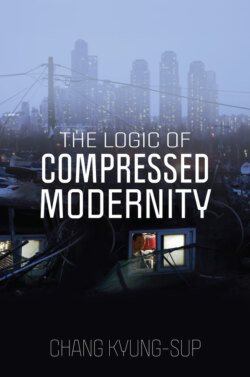Читать книгу The Logic of Compressed Modernity - Chang Kyung-Sup - Страница 10
NOTES
Оглавление1 1. Statistical indicators in this paragraph are fully presented in “Compressed Modernity in South Korea” (Chang, K. 2016a).
2 2. Republic of Korea Policy Briefing, February 27, 2019 (http://www.korea.kr/news/policyBriefingView.do?newsId=156319329).
3 3. Particularly notable scholars in this respect include: Amsden (1989) and Lim, H. (1986) on developmental governance, Koo, H. (2001) on working-class formation (2001), Choi, J. (2002) on democratization (2002), Abelmann (2003) on gender and class, Cumings (1981) on postcolonial politics, Moon, S. (2012) and Eckert (2016) on sociopolitical militarism and so forth.
4 4. For instance, a most consistent effort in this respect has been made by Shin Yong-Ha (1994), a historical sociologist whose intellectual leadership has been critical in the formation of an influential academic school that underscores indigenous historical and sociocultural conditions for contemporary social phenomena.
5 5. By nature, the contemporary Korean popular songs, called “the K-pop,” may be less explicit in such socially discursive engagement. However, the completely globalized esteem of the BTS (Bangtansonyeondan), a latest epitome in this genre, has been substantially based upon its social messages and approaches.
6 6. The South Korean government has an explicit academic policy of promoting the “international mainstreaming” of national social sciences and overseas Korean studies on the basis of Korean realities and experiences. While its scientific effect yet remains dubious, the Korean wave has certainly helped to promote the transnational popular appreciation of Korean culture, society, and history – not to mention, to the liking of the government, technocracy and likeminded media. On the part of most cultural producers, there are conscious efforts to maintain at least an arm’s length distance from such a potentially nationalist, if not chauvinistic, position.
7 7. Also, contemporary Vietnamese society is increasingly analyzed as another instance of post-socialist compressed modernity. In such studies on China and Vietnam, a possible convergence between post-socialist and late capitalist paths to modernization and development is implicitly suggested in terms of their common compressed modernity.
8 8. Harvey might be regarded as suggesting a sort of global-scale compressed modernity as a distinctive stage of (both modern and postmodern) capitalism. This stage has been further accentuated by global neoliberalism since the 1980s, largely through the same logic and/or crisis of capitalism. Besides, Harvey’s work seems to serve as an indispensable precursor to the so-called cosmopolitan turn of sociology led by Ulrich Beck (see Beck and Sznaider 2006), etc.
9 9. Before the intellectual ascendance of postcolonialism, many sociologists, such as S. N. Eisenstadt (2000), and Paget Henry (Henry and Walter 1995) had pointed out extensive hybridization between indigenous (traditional) and Western (modern) cultures in various instances of late modernization.
10 10. If postcolonialist literature and scholarship, to the extent that they intellectually and politically represent postcolonial societies or peoples themselves, are taken as social phenomena, it may be said that fundamental transcendence over the West is not entirely absent. For instance, Dipesh Chakrabarty’s (1992) critique of (Western) academic history as well as Edward Said’s (1978) critique of (Western) literature has not only transcended the epistemological constraints consciously or unconsciously imposed by the West on non-Western (at least by birth) minds but also helped enlighten Western minds about history, morality, and aesthetics.
